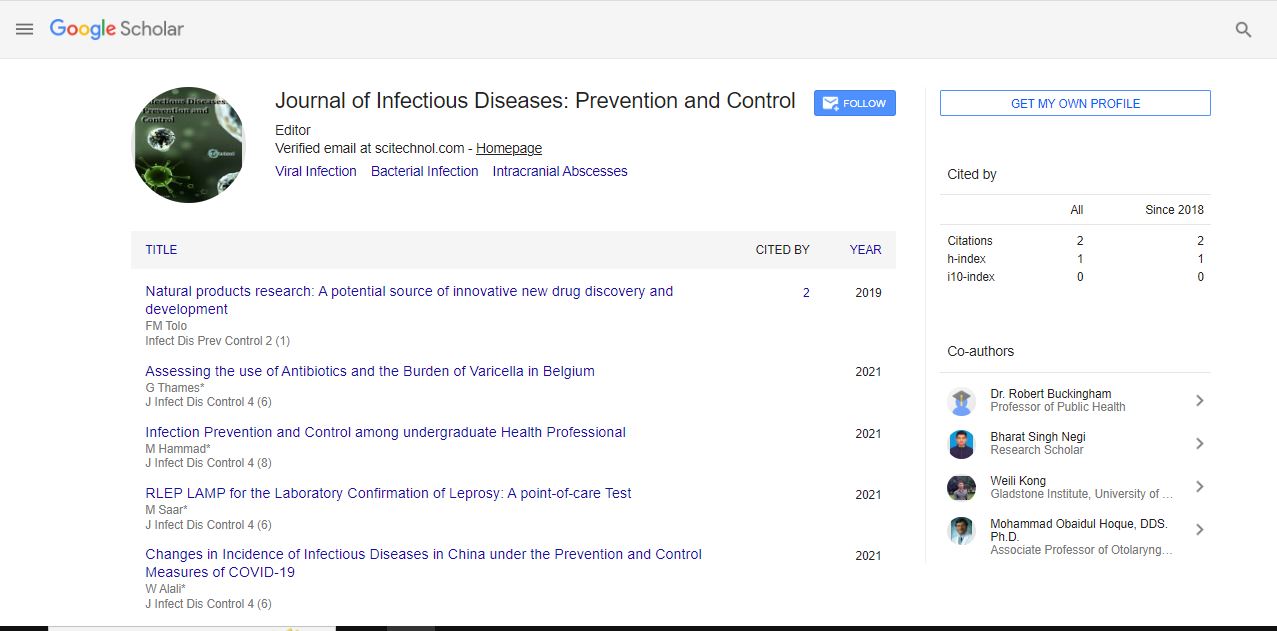Opinion Article, Vol: 6 Issue: 3
Biotechnological Applications of Microorganisms from Industry to Medicine
Kristin Ellis*
1Department of Medicine, Queen's University, Kingston, Ontario, Canada
*Corresponding Author: Kristin Ellis,
Department of Medicine, Queen's University,
Kingston, Ontario, Canada
E-mail: kristin.ellis@ki.se
Received date: 30 August, 2023, Manuscript No. IDPC-23-116432;
Editor assigned date: 01 September, 2023, PreQC No. IDPC-23-116432 (PQ);
Reviewed date: 15 September, 2023, QC No. IDPC-23-116432;
Revised date: 22 September, 2023, Manuscript No. IDPC-23-116432 (R);
Published date: 29 September, 2023, DOI: 10.36648/idpc.6.3.140
Citation: Ellis K (2023) Biotechnological Applications of Microorganisms from Industry to Medicine. Infect Dis Prev Control 6:3.
Description
Microorganisms, including bacteria, fungi, and viruses, have been instrumental in revolutionizing various aspects of human life. From industrial processes to medical breakthroughs, these tiny living entities have proven to be versatile and invaluable tools in the field of biotechnology. This essay explores the biotechnological applications of microorganisms, highlighting their contributions to both industry and medicine, and underscores the profound impact they have had on society.
In the realm of industry, microorganisms play a pivotal role in various processes, ranging from food production to environmental remediation. One of the most well-known industrial applications of microorganisms is in the fermentation of food and beverages. For centuries, microorganisms have been harnessed to produce products such as bread, cheese, beer, and yogurt. In recent times, advancements in biotechnology have expanded these capabilities, leading to the production of high-value compounds like antibiotics, enzymes, and biofuels. For instance, the production of antibiotics such as penicillin and streptomycin, which have saved countless lives, relies on microorganisms like Penicillium and Streptomyces. Microorganisms also play a significant role in wastewater treatment and environmental cleanup. In wastewater treatment plants, various microorganisms break down organic matter, helping to purify water before it is released back into the environment. Similarly, bioremediation leverages the metabolic capabilities of microorganisms to remove contaminants from soil and water.
This approach has been used successfully to clean up oil spills and other environmental disasters, offering a more sustainable and costeffective solution compared to traditional methods. The pharmaceutical industry also heavily relies on microorganisms for the production of therapeutic proteins and vaccines. Recombinant DNA technology has enabled the insertion of genes encoding specific proteins into microorganisms, turning them into protein factories. Microorganisms like Escherichia coli and Saccharomyces cerevisiae are commonly used for this purpose. The production of insulin, human growth hormone, and numerous vaccines would not be possible without the biotechnological contributions of microorganisms. Beyond industry, microorganisms have made innovative contributions to the field of medicine itself.
Microbiological research has illuminated the intricate relationships between microorganisms and human health. The human microbiome, consisting of trillions of microorganisms living in and on the human body, plays a vital role in various physiological processes. Recent studies have linked imbalances in the microbiome to conditions such as obesity, autoimmune diseases, and mental health disorders. Probiotics, which are live microorganisms that provide health benefits when consumed in adequate amounts, have gained widespread popularity. They are used to restore and maintain a healthy balance of microorganisms in the gut and have been shown to alleviate digestive disorders, boost the immune system, and improve overall well-being. Yogurt, kefir, and various dietary supplements are sources of probiotics that can be integrated into one's diet to support gut health. Furthermore, microorganisms have been instrumental in the development of diagnostic tools and medical treatments.
Polymerase Chain Reaction (PCR) technology, which relies on DNA replication in the presence of a specific microorganism, has revolutionized the detection of pathogens and genetic disorders. Microorganisms have also played a crucial role in the production of monoclonal antibodies, which are used for targeted therapies against various diseases, including cancer. Hybridomas, formed by the fusion of specific B cells and myeloma cells, produce monoclonal antibodies and are a testament to the integration of microorganisms into biotechnology. One of the most remarkable biotechnological applications of microorganisms in medicine is genetic engineering. The ability to manipulate the genetic material of microorganisms has paved the way for the development of advanced therapies like gene therapy. By inserting or modifying genes within microorganisms, scientists can produce therapeutic proteins, alter genetic pathways, and even edit human DNA. The emergence of CRISPR-Cas9 technology, which utilizes bacterial defense mechanisms to edit genes, has revolutionized the precision and efficiency of genetic engineering, promising a new era of customized medical treatments.
Vaccines, which are essential tools for preventing infectious diseases, are often developed using weakened or inactivated microorganisms. The smallpox vaccine, which led to the eradication of the disease, and the development of vaccines for polio, measles, and COVID-19 all rely on the use of microorganisms as a basis for immunization. These breakthroughs have saved countless lives and significantly reduced the burden of infectious diseases worldwide. The biotechnological applications of microorganisms are vast and encompass a wide range of industrial and medical advancements. From fermentation processes and environmental cleanup to the production of therapeutic proteins and vaccines, microorganisms have revolutionized industry. In medicine, microorganisms have been integral in understanding the human microbiome, developing probiotics, advancing diagnostic tools, and facilitating genetic engineering. Their contributions to the pharmaceutical industry and the development of vaccines have had a profound impact on global health. As technology continues to advance, it is likely that microorganisms will play an even more prominent role in shaping our future.
 Spanish
Spanish  Chinese
Chinese  Russian
Russian  German
German  French
French  Japanese
Japanese  Portuguese
Portuguese  Hindi
Hindi 